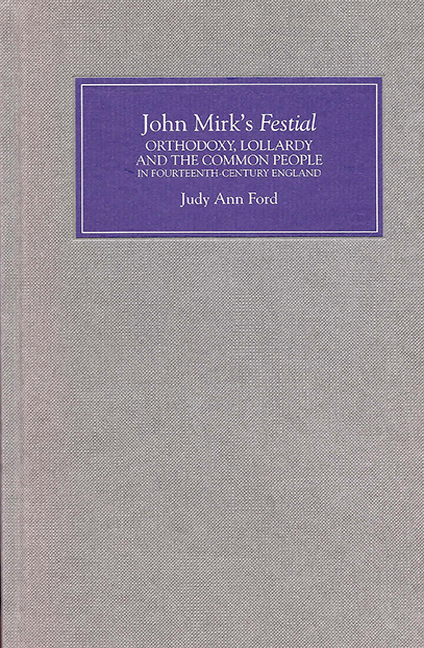Book contents
- Frontmatter
- Acknowledgements
- Contents
- Introduction: John Mirk's Festial and Fourteenth-Century England
- 1 Popular Culture and the Study of Late Medieval Piety
- 2 Clerical Power and Lay Agency
- 3 Secular Authority and Rebellion
- 4 Biblical Authority and Oral Tradition
- Conclusion: The Festial and Popular Piety in Late Medieval England
- Bibliography
- Index
3 - Secular Authority and Rebellion
Published online by Cambridge University Press: 11 May 2017
- Frontmatter
- Acknowledgements
- Contents
- Introduction: John Mirk's Festial and Fourteenth-Century England
- 1 Popular Culture and the Study of Late Medieval Piety
- 2 Clerical Power and Lay Agency
- 3 Secular Authority and Rebellion
- 4 Biblical Authority and Oral Tradition
- Conclusion: The Festial and Popular Piety in Late Medieval England
- Bibliography
- Index
Summary
‘… pore men schull be domes-men wyth Cryst …’
(‘… poor men will be judges with Christ …’)
John Mirk, sermon for Advent SundayThe Festial and the Revolt of 1381
Mirk composed the Festial in a time of upheaval that went far beyond the Lollard critique of sacerdotal authority. The most tangible expression of popular discontent with the traditional institutions of political and economic authority, such as lordship and the crown's government, was the Great Revolt of 1381, an event described by Nigel Saul as ‘the largest and most serious outbreak of popular unrest in England in the Middle Ages … never before 1381 had there been a general rebellion against the king's government. What happened in 1381 was altogether unique.’ The rebel leaders demanded stabilized rents, free negotiation of employment, the elimination of all distinction between social ranks, and the abolition of serfdom.
The Festial is in no way a rebel text: it advocates the acceptance of established political authority as much as it supports the orthodox church. Yet the degree and intensity of agreement with rebel causes expressed in such an orthodox text is astounding. Defense of the state is conveyed in much the same way as defense of the sacerdotal clergy: narrative and imagery expressing great sympathy and compassion for the oppressed is foregrounded, while affirmations of the legitimacy of the institutions of state and church are understated.
The fundamental strategy employed in the Festial to reconcile the idea of the validity of the rebels’ complaints with the acceptance of a legitimate but unjust and oppressive governing elite is to ask the oppressed to postpone their redress until after the end of the world. At that time, according to Mirk, the poor will sit at God's side during the Last Judgment to pass sentence on the rich. The Festial expresses hostility to those whose high degree of Latin literacy allowed them to oppress others – that is, to lawyers, scholars, and scribes – such as was found among the rebels of 1381, Lollards, and other radicals of the late fourteenth century. Like those of a millenarian bent and many of the mystics, the Festial favors love above the law. Nevertheless, its sermons are neither millenarian nor revolutionary: they ask that, in this world, nobles be respected as protectors of the church, that poll taxes be paid, and poverty be borne meekly.
- Type
- Chapter
- Information
- John Mirk's FestialOrthodoxy, Lollardy and the Common People in Fourteenth-Century England, pp. 70 - 112Publisher: Boydell & BrewerPrint publication year: 2006

